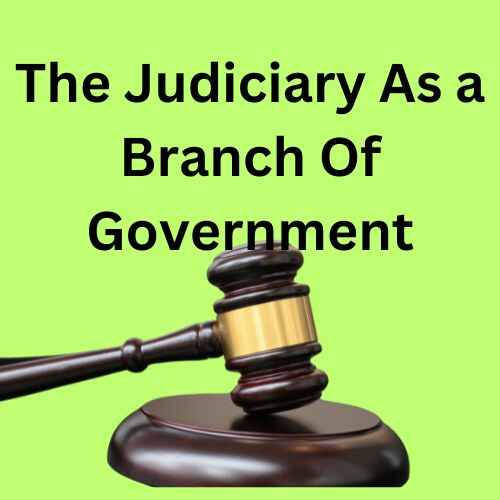The judiciary is the third branch of government which adjudicates any form of disputes that may arise between the legislature and the executive or between the federal government and the federating units.
The judiciary also interprets the law and settles disputes between citizens or between the state and its citizens.
Powers of the judiciary
The powers of the judiciary come into play when the rights of citizens are being infringed upon, maybe in the process of lawmaking and implementation of government policies. The judiciary also comes in when dispute arises among the levels of government.
It is within the powers of the judiciary to give appropriate sanctions and punishments within the ambit of the law on individuals who may run fouls of the law made by the law or when someone refuses to obey the law.
For instance, anyone who beats officials of tax in the process of the tax collection or fails to pay tax as it outlined, such persons are taken to the court to face the wrath of the law. The judiciary rules on the punishment melted out on offenders.
it has the power to ensure that its decisions and judgments are not only respected, but that they are also enforced. The judiciary has the power to impose sanctions and punishment on anybody who disrespects its decisions by charging offenders for contempt of court.
The judiciary also has the power to declare actions of the federal government ultra vires, if such power is under the residual list, powers within the jurisdiction of state government. For instance, the recent power tussle between
However, the extent at which the judiciary exercises its powers rely heavily on its independence, we shall discuss this in another topic.
Functions of the judiciary
Law interpretation
It interprets the constitution, which is the legal book that governs a country. As such, under the doctrine of the separation of powers, the judiciary is the final bus stop for law interpretation.
Quasi law-making function
The final judgement of the highest court in a country serves as precedence to others, thereby a reference point for other similar cases that might come up later in future. Another branch of government (the legislature) may rely on the pronouncement of courts to guide its law-making roles.
Dispute resolution
Conflicts between citizens are settled at the court; disagreement between the federal and state governments are settled at the courts. Citizens may sue their government if their rights have been infringed upon. It is the role of the judiciary to carefully settle disputes between parties in accordance with the law.
When it is necessary to make reference to a section of the constitution, the judiciary does so. For instance, the question of who controls the finances of the 774 local governments in Nigeria was recently settled by the Supreme Court of Nigeria.
For many years, the 36 state governments have held the local councils hostage financially through the so-called State-LGA Joint Account. But the Federal Government through the Attorney-General of the Federation and the Minister of Justice Lateef Fagbemi sued the state government, seeking direct payment of monthly allocations to the local government. The federal government won the case. Only the Judiciary can handle cases this way.
Prevention of anarchy
Through their law interpretation, the judiciary indirectly prevents what could lead to anarchy and state of lawlessness. Take for instance, if everyone takes law into their hands, the country will be ungovernable because citizens may decide to break the law at will.
Even though it is the function of the Police to arrest law breakers and maintain internal peace, offenders are charged to court for appropriate punishment. So, the interpretation of the law by the third branch of government goes a long way in creating a peaceful atmosphere.
Protecting citizens against state powers
It is the responsibility of the judiciary to protect citizens against agents of the executives such as police and soldiers who may want to overstep their boundaries, infringing on citizens’ fundamental rights.
For instance, one Abolaji Alaba sued the Nigeria Police Force for illegally arresting and detaining him in their facility between June 25, 2018, to July 1, 2018. Alaba approached the court, and in December 2023, a High Court of Justice in Ogun State, Ijebu-Ode Division ruled in his favour, awarding him N2 million damages against the Police.
In another landmark judgement in June 2024, a Federal High Court in Abuja ruled that NPF to pay the sum of N10 million in damages to Hezekiah Duru for his unlawful arrest and detention.
That’s why the judiciary is seen and described as the last hope of the common man. Even when a state governor wants to use state apparatus to oppress, citizens can approach courts to exercise their rights.
As such, aggrieved citizens can only get justice from the judiciary when the executive and the legislature have failed to apply the principle of fairness, equity, and justice.
Custodian of the constitution
The legislature and the executive may be carried away by their powers and make law or interpret the law in contrast to the constitution, it is the judiciary that comes in to say what the constitution says.
That is why the judiciary is described as the guardian and custodian of the Constitution. They protect it, guard it, and analyse its interpretation for an average man on the streets to understand.
Arbitrators to address fundamental issues
Other special roles performed by the judiciary include serving as arbitrators to ensure that justice is served. For instance, after the collapse of military rule in Nigeria (1983-1998), former President Olusegun Obasanjo constituted the Nigeria’s Human Rights Violations Investigation Commission led a retired Supreme Court Justice Chukwudifu Oputa, which was later known as Oputa Panel,
The essence of the panel was to identify Nigerians and institutions “responsible for the human rights violations, assess their effects on victims and the general society, and recommend appropriate measures to redress past injustices and prevent future violations.”
Practice questions
- Critically explain how the judiciary can help citizens to protect their rights.
- Mention two instances when the court has to come in to interpret the law between the federal and the state governments.
- Can there be justice where there is no judiciary? Explain your answer with convincing points.
Join EdubaseNG WhatsApp Channel to get the latest education & student loan tips
Join our Telegram Channel to get the latest news about Student Loans & Education News.
Are you a stakeholder in education? You can become our guest writer. Write to us using our our email address here




